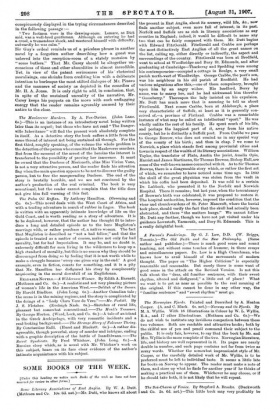SOME BOOKS OF THE WEEK.
[Under this heading we notice such Books of the week as have not been reserved for review in other forms.] Some Literary Associations of East Anglia. By W. A. Dutt. (Methuen and Co. 10s. 6d. net.)—Mr. Dutt, who knows all about the present in East Anglia, about its scenery, wild life, &c., now finds another subject, even more full of interest, in its past. Norfolk and Suffolk are as rich in literary associations as any counties in England ; indeed, it would be difficult to name any two that can be fairly compared with them. Mr. Dutt begins with Edward FitzGerald. FitzGerald and Crabbe are perhaps the most distinctively East Anglian of all the great names on the list, calling up, either directly or indirectly, the aspect and surroundings of the country. FitzGerald was born at Bredfield, went to school at Woodbridge and Bury St. Edmunds, and after graduating at Cambridge—Thackeray and Spedding were among his contemporaries—occupied a cottage in Boulge, a very small parish north-west of Woodbridge. George Crabbe, the poet's son, was his neighbour in his old parish of Bredfield. He had various migrations after this,—one of them compulsory, brought upon him by an angry widow. His landlord, Berry by name, was to marry her, and he had nicknamed him therefor "Gooseberry." Thereupon the lady insisted on his expulsion. Mr. Dutt has much more that is amusing to tell us about FitzGerald. Next comes Crabbe, born at Aldeburgh, a place very characteristic of Suffolk, at least as it is generally con- ceived of,—a province of Flatland. Crabbe was a remarkable instance of what may be called 'an intellectual "sport." He was wholly unlike the rest of his family. He spent much of his life, and perhaps the happiest part of it, away from his native county, but he is distinctly a Suffolk poet. From Crabbe we pass to George Borrow, who does not remind us in any special way of the county of his birth ; and then in chap. 7 we come to Norwich, a place which stands first among provincial cities and towns in respect of the wealth of its literary associations. William Taylor, the translator of Plato, Austin the jurist, Amelia Opie, Harriet and James Martineau, Sir Thomas Browne, Bishop Hall, are some of the well-known names connected with it. As to Sir Thomas Browne, there is a disagreeable story which, or rather the first act of which, we remember to have noticed some time ago. In 1840 the skull of the great physician was stolen from the vault in which his coffin had been deposited. It was sold to a certain Dr. Lubbock, who presented it to the Norfolk and Norwich Hospital. There it remains ; but last year, when the tercentenary of Browne's birth was celebrated, it was proposed to restore it. The hospital authorities, however, imposed the condition that the vicar and churchwardens of St. Peter Mancroft, where the burial took place, should verify the fact that the skull had actually been abstracted, and there "the matters hangs." We cannot follow Mr. Dutt any further, though we have not yet visited under his guidance Lowestoft, Yarmouth, and Bury St. Edmunds. This is a really delightful book.


































 Previous page
Previous page